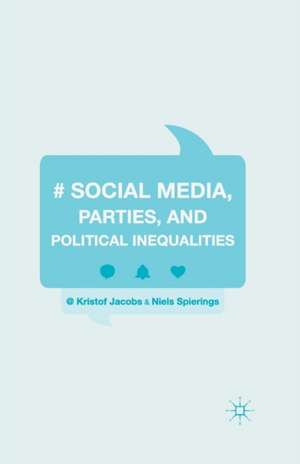Social Media, Parties, and Political Inequalities
Autor Kristof Jacobs, Niels Spieringsen Limba Engleză Paperback – 5 iun 2016
| Toate formatele și edițiile | Preț | Express |
|---|---|---|
| Paperback (1) | 383.93 lei 6-8 săpt. | |
| Palgrave Macmillan US – 5 iun 2016 | 383.93 lei 6-8 săpt. | |
| Hardback (1) | 388.34 lei 6-8 săpt. | |
| Palgrave Macmillan US – 5 ian 2016 | 388.34 lei 6-8 săpt. |
Preț: 383.93 lei
Nou
Puncte Express: 576
Preț estimativ în valută:
73.46€ • 80.05$ • 61.90£
73.46€ • 80.05$ • 61.90£
Carte tipărită la comandă
Livrare economică 23 aprilie-07 mai
Preluare comenzi: 021 569.72.76
Specificații
ISBN-13: 9781349572717
ISBN-10: 1349572713
Pagini: 221
Ilustrații: XI, 221 p.
Dimensiuni: 140 x 216 x 15 mm
Greutate: 0.32 kg
Ediția:1st ed. 2016
Editura: Palgrave Macmillan US
Colecția Palgrave Macmillan
Locul publicării:New York, United States
ISBN-10: 1349572713
Pagini: 221
Ilustrații: XI, 221 p.
Dimensiuni: 140 x 216 x 15 mm
Greutate: 0.32 kg
Ediția:1st ed. 2016
Editura: Palgrave Macmillan US
Colecția Palgrave Macmillan
Locul publicării:New York, United States
Cuprins
PART I: BACKGROUND
1. Introduction
2. Theorizing Social Media, Parties and Political Inequalities
3. Social Media in Politics: The Netherlands from a Comparative Perspective
PART II: CHANGES IN THE POWER BALANCE
4. Inter-Party Relations: David versus Goliath
5. Intra-Party Politics: David versus Nabal and Abigail
6. Social Media go Glocal: The Local and European Arenas
PART III: THE TRANSFORMATIVE IMPACT OF SOCIAL MEDIA
7. The Electoral Impact of Social Media
8. Conclusion
1. Introduction
2. Theorizing Social Media, Parties and Political Inequalities
3. Social Media in Politics: The Netherlands from a Comparative Perspective
PART II: CHANGES IN THE POWER BALANCE
4. Inter-Party Relations: David versus Goliath
5. Intra-Party Politics: David versus Nabal and Abigail
6. Social Media go Glocal: The Local and European Arenas
PART III: THE TRANSFORMATIVE IMPACT OF SOCIAL MEDIA
7. The Electoral Impact of Social Media
8. Conclusion
Recenzii
'Jacobs and Spierings are the first ones to provide a comprehensive account of the role social media play in politics. With their multi-method, comparative approach they debunk the common wisdom of massive social media effects, but also show in a nuanced way when and how these media actually matter. The book is a must-read for everyone wanting to understand how politics has changed due to the rise of new media.' - Rens Vliegenthart, Professor of Communication Science and Chair in Media and Society, University of Amsterdam, Netherlands
'This book makes an important contribution to the literature on the internet and politics. In looking comparatively at elites' use of Twitter and Facebook it extends our understanding of how far social media are affecting political practice in campaigns and elections worldwide. The authors update the standard normalization-equalization debate that has characterized the study of this topic by presenting a more nuanced understanding of party competition online.' - Rachel Gibson, Professor of Politics, University of Manchester, UK
'This book makes an important contribution to the literature on the internet and politics. In looking comparatively at elites' use of Twitter and Facebook it extends our understanding of how far social media are affecting political practice in campaigns and elections worldwide. The authors update the standard normalization-equalization debate that has characterized the study of this topic by presenting a more nuanced understanding of party competition online.' - Rachel Gibson, Professor of Politics, University of Manchester, UK
Notă biografică
Kristof Jacobs is Assistant Professor of Comparative Politics at Radboud University, Netherlands. His research focuses on elections, technological innovations, political parties and democracy. He has published on these topics in international journals such as Electoral Studies and Political Behavior.
Niels Spierings is Assistant Professor of Sociology at Radboud University, Netherlands. Previously he held appointments at the London School of Economics and the University of Essex, UK. His specializations include social media, political participation, populism, gender equality, Islam, and migration. He has published in various international journals.
Niels Spierings is Assistant Professor of Sociology at Radboud University, Netherlands. Previously he held appointments at the London School of Economics and the University of Essex, UK. His specializations include social media, political participation, populism, gender equality, Islam, and migration. He has published in various international journals.
Textul de pe ultima copertă
This book examines how social media have transformed politics in established democracies. Specifically, the authors examine the influence of the unique qualities of social media on the power balance between and within parties. They present a general theory as well as an in-depth case study of the Netherlands and compare it to the US and European democracies. The authors show how and why social media's introduction leads to equalization for some and normalization for others. Additional to national politics, Jacobs and Spierings investigate often-overlooked topics such as local and European politics and the impact on women and ethnic minorities.











